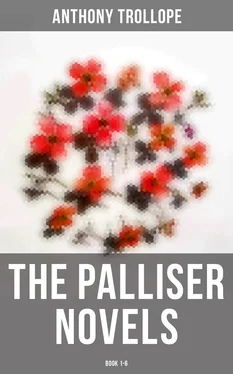"Of course you will go," said Lady Laura, in her most decided tone.
"And why?"
"In the first place it is civil in him to ask you, and why should you be uncivil in return?"
"There is nothing uncivil in not accepting a man's invitation," said Phineas.
"We are going," said Lady Laura, "and I can only say that I shall be disappointed if you do not go too. Both Mr. Gresham and Mr. Monk will be there, and I believe they have never stayed together in the same house before. I have no doubt there are a dozen men on your side of the House who would give their eyes to be there. Of course you will go."
Of course he did go. The note accepting Mr. Kennedy's invitation was written at the Reform Club within a quarter of an hour of his leaving Portman Square. He was very careful in writing to be not more familiar or more civil than Mr. Kennedy had been to himself, and then he signed himself "Yours truly, Phineas Finn." But another proposition was made to him, and a most charming proposition, during the few minutes that he remained in Portman Square. "I am so glad," said Lady Laura, "because I can now ask you to run down to us at Saulsby for a couple of days on your way to Loughlinter. Till this was fixed I couldn't ask you to come all the way to Saulsby for two days; and there won't be room for more between our leaving London and starting to Loughlinter." Phineas swore that he would have gone if it had been but for one hour, and if Saulsby had been twice the distance. "Very well; come on the 13th and go on the 15th. You must go on the 15th, unless you choose to stay with the housekeeper. And remember, Mr. Finn, we have got no grouse at Saulsby." Phineas declared that he did not care a straw for grouse.
There was another little occurrence which happened before Phineas left London, and which was not altogether so charming as his prospects at Saulsby and Loughlinter. Early in August, when the session was still incomplete, he dined with Laurence Fitzgibbon at the Reform Club. Laurence had specially invited him to do so, and made very much of him on the occasion. "By George, my dear fellow," Laurence said to him that morning, "nothing has happened to me this session that has given me so much pleasure as your being in the House. Of course there are fellows with whom one is very intimate and of whom one is very fond,—and all that sort of thing. But most of these Englishmen on our side are such cold fellows; or else they are like Ratler and Barrington Erle, thinking of nothing but politics. And then as to our own men, there are so many of them one can hardly trust! That's the truth of it. Your being in the House has been such a comfort to me!" Phineas, who really liked his friend Laurence, expressed himself very warmly in answer to this, and became affectionate, and made sundry protestations of friendship which were perfectly sincere. Their sincerity was tested after dinner, when Fitzgibbon, as they two were seated on a sofa in the corner of the smoking-room, asked Phineas to put his name to the back of a bill for two hundred and fifty pounds at six months' date.
"But, my dear Laurence," said Phineas, "two hundred and fifty pounds is a sum of money utterly beyond my reach."
"Exactly, my dear boy, and that's why I've come to you. D'ye think I'd have asked anybody who by any impossibility might have been made to pay anything for me?"
"But what's the use of it then?"
"All the use in the world. It's for me to judge of the use, you know. Why, d'ye think I'd ask it if it wasn't any use? I'll make it of use, my boy. And take my word, you'll never hear about it again. It's just a forestalling of my salary; that's all. I wouldn't do it till I saw that we were at least safe for six months to come." Then Phineas Finn with many misgivings, with much inward hatred of himself for his own weakness, did put his name on the back of the bill which Laurence Fitzgibbon had prepared for his signature.
CHAPTER XIII
SAULSBY WOOD
Table of Contents
"So you won't come to Moydrum again?" said Laurence Fitzgibbon to his friend.
"Not this autumn, Laurence. Your father would think that I want to live there."
"Bedad, it's my father would be glad to see you,—and the oftener the better."
"The fact is, my time is filled up."
"You're not going to be one of the party at Loughlinter?"
"I believe I am. Kennedy asked me, and people seem to think that everybody is to do what he bids them."
"I should think so too. I wish he had asked me. I should have thought it as good as a promise of an under-secretaryship. All the Cabinet are to be there. I don't suppose he ever had an Irishman in his house before. When do you start?"
"Well;—on the 12th or 13th. I believe I shall go to Saulsby on my way."
"The devil you will. Upon my word, Phineas, my boy, you're the luckiest fellow I know. This is your first year, and you're asked to the two most difficult houses in England. You have only to look out for an heiress now. There is little Vi Effingham;—she is sure to be at Saulsby. Good-bye, old fellow. Don't you be in the least unhappy about the bill. I'll see to making that all right."
Phineas was rather unhappy about the bill; but there was so much that was pleasant in his cup at the present moment, that he resolved, as far as possible, to ignore the bitter of that one ingredient. He was a little in the dark as to two or three matters respecting these coming visits. He would have liked to have taken a servant with him; but he had no servant, and felt ashamed to hire one for the occasion. And then he was in trouble about a gun, and the paraphernalia of shooting. He was not a bad shot at snipe in the bogs of county Clare, but he had never even seen a gun used in England. However, he bought himself a gun,—with other paraphernalia, and took a license for himself, and then groaned over the expense to which he found that his journey would subject him. And at last he hired a servant for the occasion. He was intensely ashamed of himself when he had done so, hating himself, and telling himself that he was going to the devil headlong. And why had he done it? Not that Lady Laura would like him the better, or that she would care whether he had a servant or not. She probably would know nothing of his servant. But the people about her would know, and he was foolishly anxious that the people about her should think that he was worthy of her.
Then he called on Mr. Low before he started. "I did not like to leave London without seeing you," he said; "but I know you will have nothing pleasant to say to me."
"I shall say nothing unpleasant certainly. I see your name in the divisions, and I feel a sort of envy myself."
"Any fool could go into a lobby," said Phineas.
"To tell you the truth, I have been gratified to see that you have had the patience to abstain from speaking till you had looked about you. It was more than I expected from your hot Irish blood. Going to meet Mr. Gresham and Mr. Monk,—are you? Well, I hope you may meet them in the Cabinet some day. Mind you come and see me when Parliament meets in February."
Mrs. Bunce was delighted when she found that Phineas had hired a servant; but Mr. Bunce predicted nothing but evil from so vain an expense. "Don't tell me; where is it to come from? He ain't no richer because he's in Parliament. There ain't no wages. M.P. and M.T.,"—whereby Mr. Bunce, I fear, meant empty,—"are pretty much alike when a man hasn't a fortune at his back." "But he's going to stay with all the lords in the Cabinet," said Mrs. Bunce, to whom Phineas, in his pride, had confided perhaps more than was necessary. "Cabinet, indeed," said Bunce; "if he'd stick to chambers, and let alone cabinets, he'd do a deal better. Given up his rooms, has he,—till February? He don't expect we're going to keep them empty for him!"
Читать дальше












